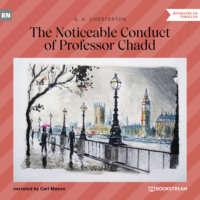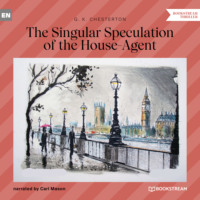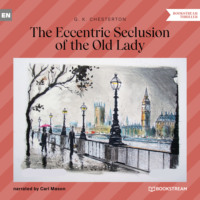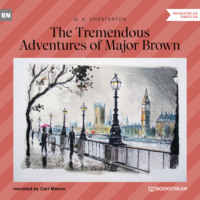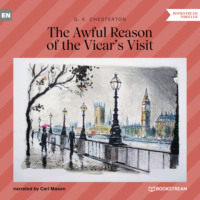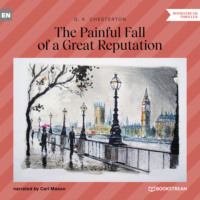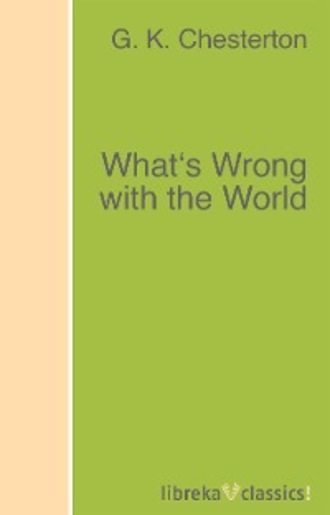
Полная версия
What's Wrong with the World
If I am made to walk the plank by a pirate, it is vain for me to offer, as a common-sense compromise, to walk along the plank for a reasonable distance. It is exactly about the reasonable distance that the pirate and I differ. There is an exquisite mathematical split second at which the plank tips up. My common-sense ends just before that instant; the pirate's common-sense begins just beyond it. But the point itself is as hard as any geometrical diagram; as abstract as any theological dogma.
III. THE NEW HYPOCRITE
But this new cloudy political cowardice has rendered useless the old English compromise. People have begun to be terrified of an improvement merely because it is complete. They call it utopian and revolutionary that anyone should really have his own way, or anything be really done, and done with. Compromise used to mean that half a loaf was better than no bread. Among modern statesmen it really seems to mean that half a loaf is better than a whole loaf.
As an instance to sharpen the argument, I take the one case of our everlasting education bills. We have actually contrived to invent a new kind of hypocrite. The old hypocrite, Tartuffe or Pecksniff, was a man whose aims were really worldly and practical, while he pretended that they were religious. The new hypocrite is one whose aims are really religious, while he pretends that they are worldly and practical. The Rev. Brown, the Wesleyan minister, sturdily declares that he cares nothing for creeds, but only for education; meanwhile, in truth, the wildest Wesleyanism is tearing his soul. The Rev. Smith, of the Church of England, explains gracefully, with the Oxford manner, that the only question for him is the prosperity and efficiency of the schools; while in truth all the evil passions of a curate are roaring within him. It is a fight of creeds masquerading as policies. I think these reverend gentlemen do themselves wrong; I think they are more pious than they will admit. Theology is not (as some suppose) expunged as an error. It is merely concealed, like a sin. Dr. Clifford really wants a theological atmosphere as much as Lord Halifax; only it is a different one. If Dr. Clifford would ask plainly for Puritanism and Lord Halifax ask plainly for Catholicism, something might be done for them. We are all, one hopes, imaginative enough to recognize the dignity and distinctness of another religion, like Islam or the cult of Apollo. I am quite ready to respect another man's faith; but it is too much to ask that I should respect his doubt, his worldly hesitations and fictions, his political bargain and make-believe. Most Nonconformists with an instinct for English history could see something poetic and national about the Archbishop of Canterbury as an Archbishop of Canterbury. It is when he does the rational British statesman that they very justifiably get annoyed. Most Anglicans with an eye for pluck and simplicity could admire Dr. Clifford as a Baptist minister. It is when he says that he is simply a citizen that nobody can possibly believe him.
But indeed the case is yet more curious than this. The one argument that used to be urged for our creedless vagueness was that at least it saved us from fanaticism. But it does not even do that. On the contrary, it creates and renews fanaticism with a force quite peculiar to itself. This is at once so strange and so true that I will ask the reader's attention to it with a little more precision.
Some people do not like the word "dogma." Fortunately they are free, and there is an alternative for them. There are two things, and two things only, for the human mind, a dogma and a prejudice. The Middle Ages were a rational epoch, an age of doctrine. Our age is, at its best, a poetical epoch, an age of prejudice. A doctrine is a definite point; a prejudice is a direction. That an ox may be eaten, while a man should not be eaten, is a doctrine. That as little as possible of anything should be eaten is a prejudice; which is also sometimes called an ideal. Now a direction is always far more fantastic than a plan. I would rather have the most archaic map of the road to Brighton than a general recommendation to turn to the left. Straight lines that are not parallel must meet at last; but curves may recoil forever. A pair of lovers might walk along the frontier of France and Germany, one on the one side and one on the other, so long as they were not vaguely told to keep away from each other. And this is a strictly true parable of the effect of our modern vagueness in losing and separating men as in a mist.





